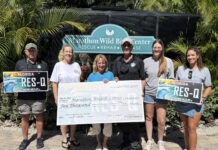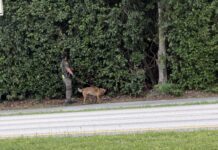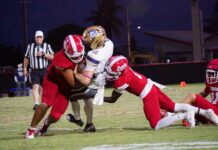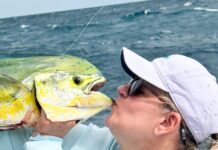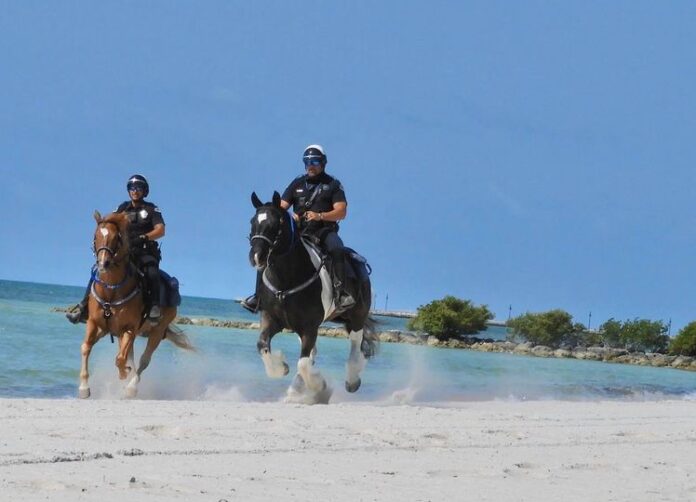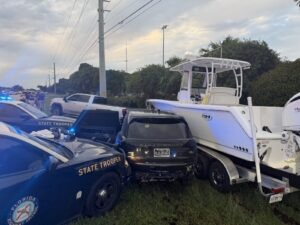Several years ago, while walking down Whitehead Street, the sight of a magnificent horse ridden by an equally impressive police officer stopped me in my tracks. The striking pair had already had the same effect on a crowd of tourists and kids who were gathered around snapping pictures and asking if they could pet it. The officer graciously allowed pictures and petting, then moved on. It was my first introduction to Key West’s horse-powered law enforcement team, or, as Officer Mike Wolf of the KWPD Mounted Patrol Unit calls it, community policing on four feet.
I met Wolf and his partner, Officer Santiago Perez, at the KWPD Mounted Patrol Unit horse stables to find out more about the work they do. While not all contemporary police departments have mounted units, it turns out they’re still an important element in law enforcement, and especially so in a town like Key West, with its large volume of pedestrian traffic, special events and small lanes, alleys and beaches.
In police work, Wolf said, a horse is known as a force multiplier. One horse can do the work of 10 officers on foot. “They’re especially effective at crowd control,” he said. “When the horse moves toward people, people move.”
While the mounted unit patrols Duval Street and Old Town regularly, they also work the beaches. During Spring Break, they’re assigned to Smathers Beach for the entire month of March. And throughout the year, Wolf, Perez and their four-legged officers regularly attend to police business, such as parking issues, calls for service and assisting other officers on calls. “We think of the horses as furry police cars,” Wolf said jokingly.
The unit is small but effective, consisting of Wolf, Perez and their three equine partners, Mila, Murphy and Monterrey, known among the officers as “Rey.” Mila, a 12-year-old dark brown half-draft, is the largest and longest-serving horse in the unit. Murphy, a large, beautiful half-draft gray Percheron, is 4 years old and is the youngest member of the four-footed force.
The newest member of the team is Rey, a gorgeous mahogany-colored German Warmblood. He was recently donated to the unit by Monica and Kevin Morse Bowers of Ocala and comes with impressive credentials as a nationally ranked hunter-jumper. “We were lucky to get him,” Wolf said.
I asked what kind of horse makes a good candidate for police work.
Wolf and Perez said they look for an animal with a calm temperament.
“Horses can spook,” Wolf explained. “Small things can set them off, so having a horse that can be controllable in any situation is key.”
Training for the horses involves exposure to many of the stimuli they may encounter while on patrol. They navigate obstacle courses and are exposed to sights and sounds such as gunfire, sirens and flying objects. “Just on Duval Street,” Wolf says, “the horses confront all kinds of crazy stimuli every day.”
Like people, horses are particular about what sets them off. For Murphy, it’s the sound of windshield wipers. “The training is constant,” Wolf said. “Every time we go out, we both get better.”
The officers undergo a 40-hour training session before working with the horses, and an additional 40-hour session annually. It is not essential that they have experience with horses, but it is helpful. Perez, who joined the unit in June, is a bona fide “Cuban Cowboy,” whose many years as a horseman include competing in team roping in Miami. Wolf says it’s been great to have someone with his experience join the team.
While Perez and Wolf are in charge of the care and training of the horses, they both emphasize they couldn’t do it without the assistance of devoted community volunteers. There are 25 active volunteers who feed and groom the horses and muck the stalls on a daily basis. If you’re a horse lover without a horse, it’s horse heaven.
Donors also play a crucial role in the funding and care of the animals. “A few years ago, the program teetered on the brink, but the community stepped up,” Wolf says. Donors help the unit stock supplies, buy equipment and food, and have been instrumental in providing funding to build the new stable at Truman Waterfront.
Key West dentist Dr. Louis Spelios has been a strong supporter of the program, purchasing not only supplies but providing funds to purchase the horses themselves.
“They’re great ambassadors for the city,” he said, “and amazing at crowd control for our festivals and parades. You’ll see the motorcycles out in crowds, trying to disperse people, but once the horses show up, they immediately move out of the way.”
Wolf said the horses enjoy getting out and being active. In their down time, they eat, sleep and occasionally go for walks on the beach. And while they might not get a pension when they retire, they do get to spend the rest of their days in a special place just for them: Millcreek Farms, a police horse retirement farm in central Florida, where they can graze to their heart’s content.
They deserve it. These four-footed crime fighters not only help keep order in a hard partying town, but also add to its charm and hospitality. In addition to their patrol duties, they appear at special events, schools and other organizations, providing vital community relations services for the police department.
As Spelios said, “They’re great ambassadors. After all, who doesn’t want to get a picture with a horse in front of Rick’s?”
To volunteer at the stables or schedule a barn tour, contact Perez at sperez@cityofkeywest-fl.gov.




